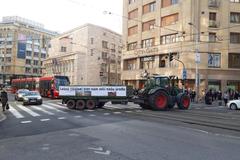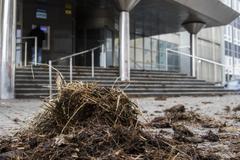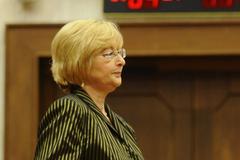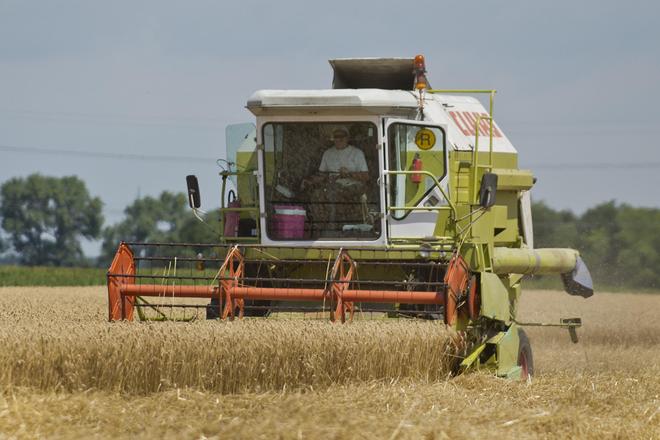Yard of Petrova Ves is the name for the area of half-rundown farm buildings with almost no one working there at the start of February. On a working day there was only one car near the warehouses surrounded by a fence. The car belonged to the gate keeper.
The keeper came out when the dog began to bark at The Slovak Spectator journalists. After a question on how his day is going he just laughed and agreed that there is not much going on during the winter.
The information that his employer has received more than a million-and-a-half euros in subsidies from the government surprised him and he looked at the empty warehouse with the broken hanging door.
The area is owned by the Agroma company, part of the business group related to Ivan Kmotrík. This group of firms has been quietly receiving millions of euros in subsidies for business improvement and direct payments for cultivating soil.

Around one hundred farmers of the Farmers Initiative (Iniciatíva poľnohospodárov) arrived in Bratislava on February 19 to protest against a system that benefits financial groups making a profit on subsidies. This same system is a disadvantage to small and medium farmers who face trouble when fighting for their rights. They pointed out issues such as land consolidation, how a farmer can obtain the land, and how the Agricultural Paying Agency (PPA) runs and ignores property rights.
They have been protesting since February 2018, after the murder of journalist Jan Kuciak and Martina Kušnírová. In his last story Kuciak wrote about the Italian mafia doing business in eastern Slovakia and abusing smaller farmers.
“After negotiations in Košice, we thought things would be moving forward,” said one of the protesting farmers, František Oravec, as quoted by the Sme daily. “But we were disappointed by the talks at the Government Office.”
Kmotrík’s business
Reports on this side of Ivan Kmotrík’s business rarely appear in the media. The entrepreneur is known as the owner of the Slovan football club, the private broadcaster TA3, and the Grafobal printing company. The media describe Kmotrík as an oligarch with close ties to Smer and SNS. Those parties used to help his business in the past.
For example, he received a 27-million euro subsidy for the construction of the Slovan stadium in Bratislava from education minister Peter Plavčan (SNS). He also welcomed the idea of SNS chief Andrej Danko helping medium and large companies contribute to their employees for recreation, since Kmotrík’s company also distributes recreational vouchers.
Besides these activities, he quietly developed an agricultural business. Kmotrík and his people bought land in the Skalica region years ago. From 2000 to 2006, they founded or bought several agricultural companies. These are Agro Group Bodíky, PD Gbely, ROD Skalica, Agroma, J.F.A. Invest, Komposesorát Vojka s.r.o. and AG-Management Slovakia.
The Slovak Spectator discovered ten subsidies these firms received, in the total amount of €2,500,000 in Eurofunds. They also received €1,380,000 in direct payments on cultivated soil in 2016 and 2017. PPA does not publish payments for other years.
Kmotrík denied claims that he used his influence to receive subsidies from Eurofunds.
“We have saved several farms [from bankruptcy], we do nothing wrong," Kmotrík told The Slovak Spectator.
Mafia in the east
In September 2016 the farmer František Oravec was attacked by people who prevented him from entering his own land. They punched him in the face several times.
“They were so strong, they broke my nose and injured my backbone,” Oravec told the media in April 2018. Since then he has had problems with his hearing, sleeping and sometimes suddenly loses consciousness.

Oravec became one of the farmers’ leaders who started protesting against the mafia shortly after Kuciak’s murder.
The main problem of the protesting farmers is that large companies are fraudulently drawing agricultural subsidies on land instead of the small farmers who actually farm on the land.
These farmers used to fill out criminal complaints, but it takes years to solve the dispute and the land cannot be used until it is over. It is not so damaging for big companies but small farmers face bankruptcy if they cannot farm the land for several years.
Baroness Rošková
The delegation of the European Anti-Fraud Office (OLAF), which approached those farmers in February 2019, confirmed that the Slovak system allows such fraud.
“This is not hearsay," Czech MEP Tomáš Zdechovským, who joined the delegation, told the Czech press agency ČTK in February. “There are photos, videos, specific court or administrative decisions.”
70 percent of the subsidies are allotted for seven percent of the largest players in agriculture, which are often financial groups. It is one of the reasons why there is now only a small share of domestic products in stores in Slovakia, according to Slovak MEP Ivan Štefanec.

The protests have already brought about some improvements. In December 2018, the police charged Smer representative Ľubica Rošková and her company Agro Porúbka for subsidies fraud as well as damaging the financial interests of EU.
Rošková and her firm used the fact that PPA has trouble checking every single application for soil subsidies. The firm allegedly received subsidies for concrete areas such as an airport or a car park in eastern Slovakia.
She received the nickname “Baroness” from the locals because she had wealth and family ties among the police, prosecutors and Ministry of Agriculture.
Disappointed farmers
In April 2018, farmers wrote a list of 18 requirements and proposals to solve this situation. The main issue is preventing financial groups from acquiring subsidies for land they do not own.
They demand the creation of a special police unit focusing on agriculture, called "Agricultural Cobra", and adopting legislation that prevents people from acquiring subsidies for land without proving that they own or rent this land. They also require the state start's the process of uniting land parts that are currently formally dispersed.
The state failed to adopt these measures, according to farmers who came to Bratislava in February.
On the contrary, the Prime Minister Peter Pellegrini (Smer) labelled those February talks with farmers as constructive. The consensus could not have been made in some areas as a broader debate is necessary, he added.
“Many of the farmers' demands are being dealt with or have been resolved,” Pellegrini said, as quoted by the TASR newswire.
The farmers have the right to protest, but no one has the right to describe the situation at the Agriculture Ministry as bad, he added.
“The government was generalising our terms,” said Patrik Magdoško of the Farmers Initiative about the farmers' meeting with Pellegrini and his ministers, as quoted by the TASR newswire.
“The only proposal we acknowledge is the establishment of the environmental criminal police,” claimed Magdoško, as quoted by TASR. “We have not agreed on other things with the government.”



 Farmers are starting to get anxious. (source: TASR)
Farmers are starting to get anxious. (source: TASR)